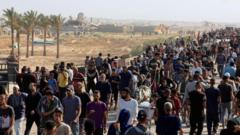*The ongoing tensions between Israel and Hezbollah have erupted once more, with air strikes resulting in significant civilian casualties in Lebanon's Bekaa Valley.*
**Israeli Air Strikes Claim 12 Lives in Bekaa Valley, Governor Reports**

**Israeli Air Strikes Claim 12 Lives in Bekaa Valley, Governor Reports**
*Escalation in hostilities raises fears of renewed conflict in Lebanon as civilians bear the brunt of military actions.*
At least 12 people have died in Israeli air strikes targeting the Bekaa Valley in eastern Lebanon, according to Baalbek-Hermel Governor Bachir Khodr. Among the deceased are seven Syrians, including a family of five, alongside three Lebanese nationals. The strikes reportedly affected the Wadi Faara area, while additional casualties were confirmed in Shmustar.
In a response to these attacks, the Israeli military stated that its strikes aimed at multiple military installations belonging to Hezbollah, including training facilities associated with the elite Radwan Force. Governor Khodr condemned these actions, asserting they violate the recent ceasefire agreement as well as Lebanon's sovereignty.
This incident marks the most lethal assault since a ceasefire concluded a year-long conflict between Israel and Hezbollah, which had resulted in heavy losses for the armed group. Hezbollah, while yet to formally respond to the air strikes, has expressed concern through its affiliated media, citing breaches of both the ceasefire and territorial integrity.
Israeli Defense Forces spokesman Lt Col Avichay Adraee confirmed via social media that the operations targeted key Hezbollah locations, including those used for storing weaponry and military resources. Adraee emphasized that these sites represent direct threats to Israel, reinforcing the nation’s justification for launching such strikes.
Israeli Defense Minister Israel Katz declared that the strikes conveyed “a clear message” to both Hezbollah and the Lebanese government, highlighting that Israel remains vigilant and prepared to counteract any efforts to restore Hezbollah's military capabilities.
The ceasefire agreement, facilitated by US intervention last November, called for the full enforcement of UN Security Council resolution 1701, which sought to maintain peace in the region following the 2006 conflict. The terms stipulated Hezbollah's withdrawal from certain areas, leaving only the Lebanese army and UN peacekeepers authorized to remain armed in the vicinity. Despite these agreements, Israeli forces have maintained a military presence at strategical points across southern Lebanon, leading to ongoing disputes over compliance with the resolution.
As the situation evolves, concerns grow among civilians in the region about the potential for renewed, extensive fighting that could destabilize both Lebanon and the wider Middle East.




















